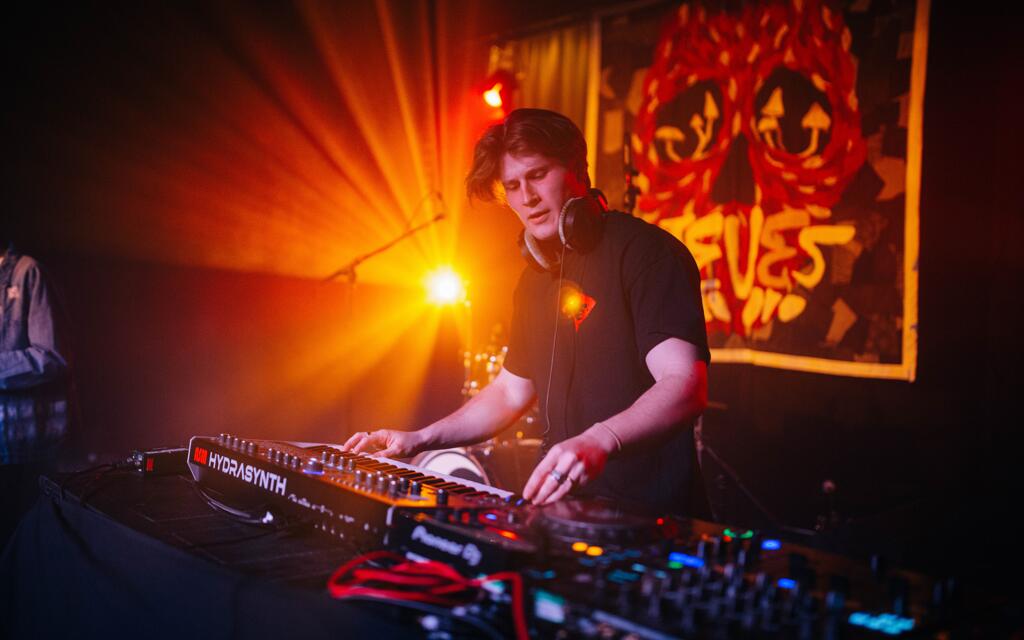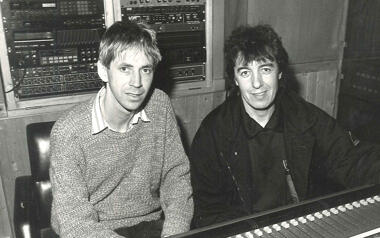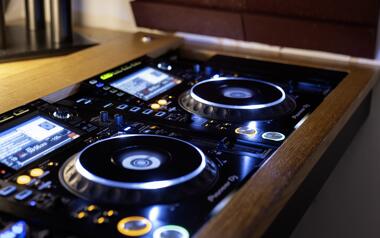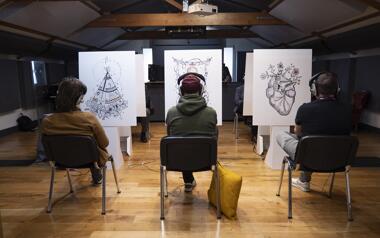But how do you become a DJ? Well, these are our tips to help you start your dream career.
Choose your set up
Multi players, such as Pioneer CDJs, are ever-present in DJ booths worldwide. Coupled with a mixer, they are generally the go-to choice of equipment for aspiring and professional DJs today. All you need to take to your next gig is a pair of headphones and a USB drive with your music collection on. Using the same equipment as other DJs when starting out has its advantages. Smaller clubs, where you’ll start off, generally have limited space in a DJ booth, perhaps enough for just one set up, meaning they might not be able to accommodate anything else. The event organisers are also unlikely to have the budget to hire any additional equipment just for you – you’d have to bring your own.
An alternative to multi players are vinyl turntables. There are professional DJs who still use turntables, typically in genres where tracks are still released on vinyl. Digital Vinyl Systems (DVS), such as Native Instruments Trakor, Serato and Pioneer’s Rekordbox allow you to combine vinyl turntables with a digital music collection. This is a great solution for those who prefer the experience of using turntables but want to be able to play the latest tracks. It’s generally cheaper to purchase turntables than multi players but the cost of purchasing vinyl will significantly overtake digital downloads as your collection grows. You also have to take into account the space required to store a vinyl collection and the costs (and effort!) associated with transporting record bags to and from gigs.
DVS systems can also be used with dedicated controllers and are generally at a lower price point than other options available. They’re also small enough to be easily transported to and from gigs.
When selecting a pair of headphones, you want a light-weight pair that you find comfortable wearing for extended periods. Closed-back designs are beneficial for DJs, as are those that are suited for single-ear listening. The Sennheiser HD 25 headphones have these features and are one of the most popular selections for DJs.
Finally, you may wish to bring some live elements into your DJ sets. This can involve the use of a range of tools: from Ableton Live and a Push controller, synthesisers, samplers, loop stations and much more. Coupling these tools with one of the aforementioned set ups could make your sets unique.
Whatever set up you choose, ensure you know how to connect all of the equipment together. Have spare cables and be prepared to troubleshoot any issues that arise.
Learn the key skills
Like learning to play an instrument, there are key skills required to become a proficient DJ who can create exciting and dynamic sets. Some of which include:
- Cueing and Beatmatching – The art of lining up two or more tracks at the same tempo and phase.
- EQing – cutting and boosting frequencies to enable multiple tracks to work well together
- Transitions and phrasing – The mixing of one track to the other.
- Gain structure – Managing the adjustment of audio levels to prevent clipping and keep your mixes sounding great.
These will all take practise and time to master. There are technical solutions that can automatically sync tracks and manage gain control for you, but they might not always work as you expect. It’s better to have the core skills on-hand, even if you rely on these tools, should things start to go awry.
Our one-to-one tuition is the perfect way to learn these skills and can supplement your practise at home.
Build your music collection
Along with their skills behind the decks, a DJ’s song selection creates their sonic identity. Start off by getting all the tracks you want to play in a set and continue from there. Keeping an eye on new releases from your favourite artists and labels is a great way to keep up-to-date. Listen to radio shows and attend club nights to see which tracks the crowd react to the most.
There are a range of online stores for digital music, including Juno Download, Beatport and Bandcamp. Ensure you’ve always got an up-to-date backup of your digital music collection.
For vinyl, get to know your local record stores. Manchester heavyweights include Eastern Bloc Records, Piccadilly Records and Vinyl Exchange. The likes of Discogs and Ebay are great if you’re looking for specific tracks too. Ensure you’re storing your vinyl vertically, in a well ventilated space and out of direct sunlight.
Record your mixes
Start recording your mixes at home and review them for any areas of improvement. Could your transitions be more varied? Is your song selection and set structure achieving what you want it to do?
Promotion
It’s all about discovery. People are constantly looking for sets to listen to, so sharing your recordings with others will help you grow a following. Upload them to Mixcloud and Soundcloud, and share them on your socials. Consider creating your own website. You could even create Spotify playlists to showcase your selections.
Share your mixes with event organisers and promoters too. Take gigs and build relationships wherever you can. Consider the services of an agency to help get you gigs later down the line.
Start creating your own music
Creating your own music or releasing remixes is a great way to increase exposure. If you produce a track that people love, you may start to appear in download charts and playlists. Other DJs will start playing your tracks, and you’ll soon find demand for your sets increasing.
Join us on your path to becoming a DJ
Now you know how to become a DJ, why not take a look at our BA (Hons) Electronic Music Production and Performance course. We offer a range of Music Production courses, including undergraduate, postgraduate and industry courses.
If you’re more interested in music management and event organisation, then our Music Business courses are just for you.
Finally, our Sound Engineering courses are fantastic if you’re eager to learn how to record and deliver audio to the highest standards. We’ll have you gain the essential skills you need to grow in the music industry.
You’ll get real opportunities, learn from industry experts, and develop your skills on your journey to a career in music and sound. Take a look at our range of subject areas, or see what student life is like at Spirit Studios by attending one of our open days.
If you’re ready to kickstart your music career, then apply now for the course that suits you. Contact us today if you want to find out more.
Interested in studying with us?
Click below to start your application, register for an open day or get in touch with any questions



